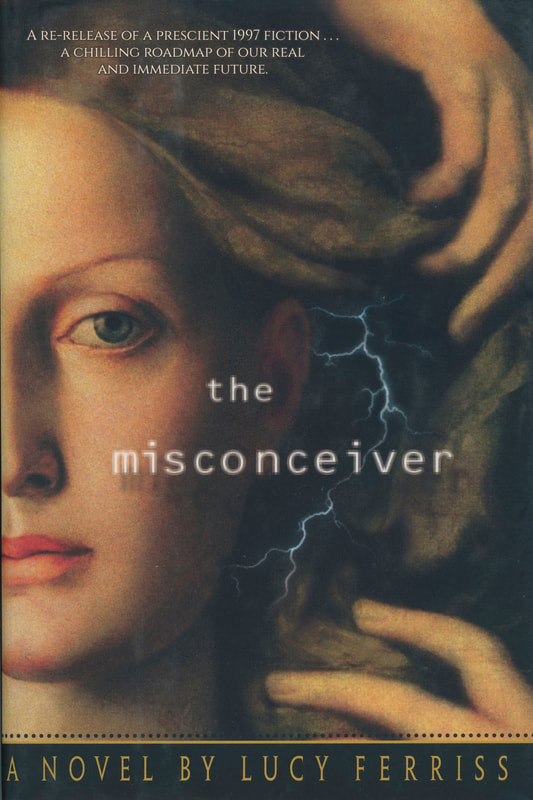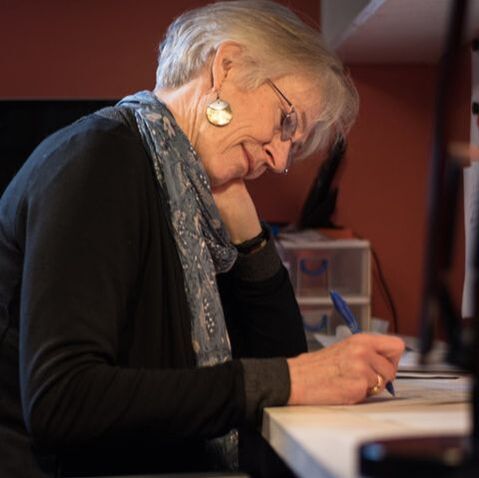The Misconceiver: A Novel by Lucy Ferriss

This fresh release of an epochal novel from the late 1990s unlocks the dystopic world of the United States circa 2026, when Roe v. Wade has been overturned and abortion finally banned in all 50 states. Following in the steps of her dead sister and mother, narrator Phoebe Masters works in the computer industry by day and at night performs illegal "misconceptions" in her basement, restoring to desperate women some measure of control over their own bodies. Outside, technology has progressed but social change has moved backward. Married women tend to stay home. Amniocentesis is illegal. The worst punishment for rape is a paternity suit. Homosexuality is back in the closet.
Yet despite her profession, despite the connection she sees between her job stamping out malware and her illicit vocation terminating pregnancies, Phoebe holds few political beliefs—until a love affair forces her to choose between closing herself off and revealing her secret. Betrayed, arrested, and jailed, she begins to confront the multiple contradictions of her world. Eventually she must choose— between revenge and forgiveness, family and self, guilt and accountability, love and action.
While The Misconceiver initially presents its characters’ repression matter-of-factly, the accretion of detail concerning their emotional and physical pain makes this far more than a merely political novel. Phoebe is fiercely loyal to the memory of her sister but anxious for her own freedom. Haunted by memory and hunted by the law, she begins to find her true self even as she sheds her old identity. Set in a future that is not far-fetched but well within the range of our imagination, The Misconceiver not only addresses a vivid issue of our time but also brings to life characters and relationships that could well be ours, just over the horizon of time.
PRAISE FOR THE MISCONCEIVER:
The Supreme Court’s scheme to subject women’s bodies to the whims of their respective state governments has birthed a million new allusions to The Handmaid’s Tale. But let's consider another feminist novel . . . published 25 years ago.
--Ron Charles, The Washington Post
The Misconceiver is primarily a powerful novel of dystopia. But it is also a very tense thriller. . . . Ferriss is a fine writer, and in this dark and starkly realistic tale, she answers all her own questions, pulling no punches.
--The Times of London
If in this novel Ferriss makes you think, she will also make you feel.
--Publishers Weekly (starred review)
The Misconceiver stands stalwartly by John Irving’s Cider House Rules as a compassionate novel about abortion and, thus, about women.
--St. Louis Post-Dispatch
The Misconceiver is a graphic and prescient tale about courageous women who risk all to help each other in desparate circumstances. Lucy Ferriss maps the landscape of what happens when government bans abortions and forces childbirth on pregnant women, and the flowering of resistance in the face of cruelty. A complex and compassionate grappling with a complex and deeply personal terrain.
--Kate Manning, author of My Notorious Life
In Ferriss' convincing early 21st century dystopia abortion is outlawed. At great risk, her eponymous female lead seeks to return to women some small measure of reproductive rights. The clandestine nature of her work, and self doubts, imperil even this feeble lifeline. As Ray Bradbury once said, 'I'm not here to predict the future, I'm here to warn about it.'
--Time Out, London
Lucy Ferriss has given us a chilling, compelling look at a not-so-distant world, one that is eerily prescient and disturbing.
--Susan Straight, author of MECCA
A dystopian novel already drawing comparisons to Margaret Atwood's The Handmaid's Tale. When Roe v. Wade is overturned in 2011, Phoebe find herself performing illegal "misconceptions" in her basement, dealing with desperate women, a repressive justice system, and her own conscience.
--SF Site: New Books in Science Fiction
In 2026, 15 years after Roe v. Wade was overturned and the Human Life Amendment passed, abortions are called misconceptions. The government doesn't allow married women to work; indeed, women are expected to be subservient to men. Phoebe, Ferriss's narrator, and her sister Marie learned to be misconceivers after the "antis" blew up an abortion clinic in which their mother worked, yet neither is comfortable with it. They believe they are doing wrong. . . . Those who stick with her will appreciate Ferriss' sympathetic handling of Phoebe's deep-seated problems and heated relationship with Arthur, a doctor.
--Booklist
Ferriss worthily acknowledges the complexities of the abortion debate, and her dystopia . . . is thoroughly imagined.
--Kirkus Reviews
Fast-paced, intelligent, risky storytelling by one of America’s brightest young writers.
--Molly Giles, Author of Rough Translations
A powerful, painful book.
--Frederick Busch, author of Girls
Yet despite her profession, despite the connection she sees between her job stamping out malware and her illicit vocation terminating pregnancies, Phoebe holds few political beliefs—until a love affair forces her to choose between closing herself off and revealing her secret. Betrayed, arrested, and jailed, she begins to confront the multiple contradictions of her world. Eventually she must choose— between revenge and forgiveness, family and self, guilt and accountability, love and action.
While The Misconceiver initially presents its characters’ repression matter-of-factly, the accretion of detail concerning their emotional and physical pain makes this far more than a merely political novel. Phoebe is fiercely loyal to the memory of her sister but anxious for her own freedom. Haunted by memory and hunted by the law, she begins to find her true self even as she sheds her old identity. Set in a future that is not far-fetched but well within the range of our imagination, The Misconceiver not only addresses a vivid issue of our time but also brings to life characters and relationships that could well be ours, just over the horizon of time.
PRAISE FOR THE MISCONCEIVER:
The Supreme Court’s scheme to subject women’s bodies to the whims of their respective state governments has birthed a million new allusions to The Handmaid’s Tale. But let's consider another feminist novel . . . published 25 years ago.
--Ron Charles, The Washington Post
The Misconceiver is primarily a powerful novel of dystopia. But it is also a very tense thriller. . . . Ferriss is a fine writer, and in this dark and starkly realistic tale, she answers all her own questions, pulling no punches.
--The Times of London
If in this novel Ferriss makes you think, she will also make you feel.
--Publishers Weekly (starred review)
The Misconceiver stands stalwartly by John Irving’s Cider House Rules as a compassionate novel about abortion and, thus, about women.
--St. Louis Post-Dispatch
The Misconceiver is a graphic and prescient tale about courageous women who risk all to help each other in desparate circumstances. Lucy Ferriss maps the landscape of what happens when government bans abortions and forces childbirth on pregnant women, and the flowering of resistance in the face of cruelty. A complex and compassionate grappling with a complex and deeply personal terrain.
--Kate Manning, author of My Notorious Life
In Ferriss' convincing early 21st century dystopia abortion is outlawed. At great risk, her eponymous female lead seeks to return to women some small measure of reproductive rights. The clandestine nature of her work, and self doubts, imperil even this feeble lifeline. As Ray Bradbury once said, 'I'm not here to predict the future, I'm here to warn about it.'
--Time Out, London
Lucy Ferriss has given us a chilling, compelling look at a not-so-distant world, one that is eerily prescient and disturbing.
--Susan Straight, author of MECCA
A dystopian novel already drawing comparisons to Margaret Atwood's The Handmaid's Tale. When Roe v. Wade is overturned in 2011, Phoebe find herself performing illegal "misconceptions" in her basement, dealing with desperate women, a repressive justice system, and her own conscience.
--SF Site: New Books in Science Fiction
In 2026, 15 years after Roe v. Wade was overturned and the Human Life Amendment passed, abortions are called misconceptions. The government doesn't allow married women to work; indeed, women are expected to be subservient to men. Phoebe, Ferriss's narrator, and her sister Marie learned to be misconceivers after the "antis" blew up an abortion clinic in which their mother worked, yet neither is comfortable with it. They believe they are doing wrong. . . . Those who stick with her will appreciate Ferriss' sympathetic handling of Phoebe's deep-seated problems and heated relationship with Arthur, a doctor.
--Booklist
Ferriss worthily acknowledges the complexities of the abortion debate, and her dystopia . . . is thoroughly imagined.
--Kirkus Reviews
Fast-paced, intelligent, risky storytelling by one of America’s brightest young writers.
--Molly Giles, Author of Rough Translations
A powerful, painful book.
--Frederick Busch, author of Girls
Order The Misconceiver (Ebook)
Order The Misconceiver (Paperback)
Book Club and Study Guide
| book_club_guide.docx | |
| File Size: | 1331 kb |
| File Type: | docx |
Video with Author-Read Excerpt

Born in St. Louis, Lucy Ferriss has lived on both coasts, in the middle, and abroad. The overturning of Roe vs. Wade has brought renewed attention to her frighteningly prescient novel, The Misconceiver, a dystopian near-future story of survival in a Christo-Fascist U.S., where laws increasingly turn against women, LGBTQ, and people of color. Ferriss's eleventh book, Foreign Climes, won the Brighthorse Books Award in short fiction. Other recent fiction includes A Sister to Honor (Penguin, 2015) and The Lost Daughter (2012), a Book-of-the-Month pick. Her memoir Unveiling the Prophet was named Best Book of the Year by the Riverfront Times. Her novel Nerves of the Heart was a finalist in the Peter Taylor Prize competition. Leaving the Neighborhood and Other Stories was the 2000 winner of the Mid-List First Series Award. Other short fiction and essays have appeared most recently in The American Scholar, december, Missouri Review, New England Review, and Crazyhorse and have received recognition from the National Endowment for the Arts, the Faulkner Society, and the Fulbright Commission, among others. She lives with her husband, Don Moon, in the Berkshires and Connecticut, where she has two strong sons and abiding passions for music, politics, travel, tennis, and wilderness. Her collection of essays, Meditations for a New Century, is the winner of the Wandering Aengus Book Award in Nonfiction.
